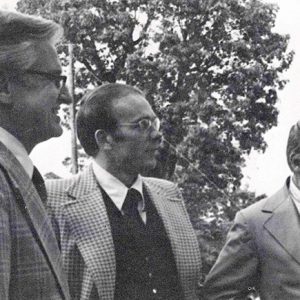calsfoundation@cals.org
Susan Carol Henley McDougal (1955–)
Susan Carol Henley McDougal became famous in the 1990s for refusing to testify before Kenneth Starr and the Office of Independent Counsel (OIC) grand jury held in Little Rock (Pulaski County) during the Whitewater scandal investigation. She was imprisoned for almost two years, before ultimately being found not guilty and released.
Susan Henley was born in 1955 in Heidelberg, Germany, to James Henley, a U.S. Army sergeant originally from Camden (Ouachita County), and Laurette Mathieu Henley, a native of Belgium. Susan grew up in Camden, the middle child of seven, and attended public schools. She entered Ouachita Baptist University (OBU) at Arkadelphia (Clark County) in the fall of 1972 on a Latin scholarship.
At OBU, she met Jim McDougal, then a political science faculty member. He invited her to accompany him to political events for Arkansas politicians whom he considered his friends, such as Jim Guy Tucker. While both were at OBU, Jim McDougal asked her to organize a group of her fellow students to attend a campaign event for Bill Clinton, then running for Arkansas attorney general. The couple married on May 23, 1976, just after her graduation from OBU, with former lieutenant governor Bob Riley presiding.
Her husband left OBU in 1976, just after her graduation, and the two worked together in real estate. In 1978, they partnered with Bill and Hillary Clinton to buy approximately 230 undeveloped acres on the south bank of the White River in the Ozarks outside the town of Flippin (Marion County) for about $203,000. It was incorporated on June 18, 1979, as the Whitewater Development Corporation.
In 1980, McDougal’s husband purchased the Bank of Kingston in Madison County and renamed it Madison Bank & Trust. It failed in 1983. That same year, he purchased Woodruff Savings & Loan in Augusta (Woodruff County), which was renamed Madison Guaranty Savings & Loan and moved to Little Rock. In 1983, Maple Creek Farms, a residential development south of Little Rock, was created and wholly owned by Madison Financial Corporation, a real estate development company the couple ran. McDougal’s husband created television ads with her riding a white horse, and they bought local TV advertising space, saturating movies and sporting events. The ads—and McDougal—became well known in central Arkansas.
In 1984, McDougal ran unsuccessfully for election to the Little Rock City Board and later separated from her husband, moving to Dallas, Texas. She soon returned to Little Rock, where her husband asked her to sign for a $300,000 Small Business Development loan from former judge David Hale. In 1988, she moved to California. The following year, she became a personal assistant to Nancy Mehta, wife of symphony conductor Zubin Mehta, but six months after McDougal left that position in 1992, Nancy Mehta filed charges of forgery against McDougal, who was found not guilty on all counts. In 1990, McDougal’s divorce was finalized.
On August, 17, 1995, during the investigations of what came to be called the Whitewater scandal, McDougal and her former husband were charged with bank fraud, along with Jim Guy Tucker, regarding questionable loans. They were convicted on May 28, 1996. McDougal herself was convicted of four felonies: mail fraud, wire fraud, misapplication of funds, and aiding and abetting, charges stemming from her signing for the loan from Hale. Her former husband began cooperating with the OIC, but she refused to testify, believing that the OIC was interested only in obtaining damaging information on the Clintons. She also cited a conversation with her mother, who compared the OIC tactics with those of the Nazis, turning friends and family members against each other. She stated that she gladly would have testified under oath in a public courtroom, but was never asked to do so, and she was sent to prison for civil contempt on September 9, 1996.
She spent approximately twenty-two months in seven jails, including maximum security prisons with violent offenders. She was also held for seven weeks in a Plexiglas-enclosed soundproof cell, an experience she described as “hellish.” On April 3, 1998, after completing the maximum sentence for contempt, she again refused to testify before Starr’s grand jury but, in 1999, was found not guilty of obstruction of justice and ordered to be released.
In 2001, on his last day in the White House, Clinton granted McDougal a presidential pardon, which she learned about from watching television. In 2003, McDougal published the book The Woman Who Wouldn’t Talk: Why I Refused to Testify against the Clintons & What I Learned in Jail. The book remained on the New York Times bestseller list for two weeks. In June 2011, when she had completed training, McDougal began working as a chaplain at the University of Arkansas for Medical Sciences (UAMS) in Little Rock. She is also a public speaker around the country, addressing conditions in women’s prisons.
For additional information:
Bernstein, Carl. A Woman in Charge: The Life of Hillary Rodham Clinton. New York: Knopf, 2007.
Cottingham, Jan. “Susan McDougal: The Immovable Object Defeats the Irresistible Force.” Arkansas Times, April 30, 1999, pp. 22–25.
McDougal, Susan, with Pat Harris. The Woman Who Wouldn’t Talk: Why I Refused to Testify against the Clintons & What I Learned in Jail. New York: Carroll & Graf Publishers, 2003.
“Once upon a Time in Arkansas.” Frontline Online. http://www.pbs.org/wgbh//pages/frontline/shows/arkansas/interviews/smcdougal.html (accessed September 12, 2022).
Nancy Hendricks
Arkansas State University









Comments
No comments on this entry yet.